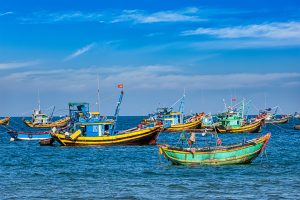India has long complained about Chinese overfishing in and around its territorial waters, and this month’s World Trade Organization (WTO) meeting in Abu Dhabi gives New Delhi a chance to do something about it.
Trade negotiators from around the world will gather on February 26 for the WTO’s 13th Ministerial Conference. On the table are rules to implement the 2022 agreement on fisheries subsidies. While that deal provided an important framework, it so far lacks the heft and specifics to curb the subsidies some nations have in place that drive harmful overfishing.
The looming question is whether enough nations, which is technically two-thirds of the 164 WTO members, can agree to implement these rules and strike a deal. At the moment, the proposal is more than 40 short, and India, Bangladesh, Pakistan, and Vietnam – each of which has a large stake in the outcome – have yet to get on board.
Most people don’t realize that 34 percent of the world’s fish stocks are already overfished, and another 60 percent are maximally fished. Overfished means the catch is unsustainably high and the stocks are in decline. Maximally fished means any increase in the catch rate will cause it to be overfished.
Countries are building larger vessels with giant trawlers that scrape the bottom of the seas. Even worse, they are using taxpayer dollars to do it. The economics of fishing on the high seas are such that 54 percent of it wouldn’t even happen without government subsidies.
This is especially concerning in the Asia-Pacific region, where fisheries play a vital role in food availability, nutritional security and livelihoods. Asia-Pacific countries contribute 55 percent of global capture fisheries production (the volume of fish catches). But the rate at which the oceans are being depleted puts those livelihoods and the sustainability of our oceans at risk.
Stopping these harmful subsidies should be a no-brainer. We only have one world ocean and when fisheries collapse, they often do not come back. In a recent piece, former Coast Guard and INTERPOL official Bradley Soule and I recalled the pollock fishery of the central Bering Sea. It would be one of the largest fisheries in the world if it still existed, but overfishing led to its collapse. A fishing “moratorium” in that area was declared in the 1990s, but only after the area was maximally fished. It was unable to recover.
It’s been a long time since WTO members have struck a meaningful deal – so long that some have even questioned the usefulness of the organization. Getting all 164 members to reach a consensus has proven increasingly difficult over the years. India, for example, has blocked progress in the current round of fishery subsidy talks with demands of 25-year transition periods and other carve-outs for developing economies.
But those demands are at odds with the facts. India’s maritime experts have long voiced concern over large subsidized foreign vessels – mostly from China – overfishing the waters around India’s coasts. The WTO agreement would give New Delhi a tool to fight back.
India’s per-capita catch per fisher has declined from 3.0 metric tons in 1980 to 2.3 metric tons in 2019, according to Badri Narayanan Gopalakrishnan and M. Krishnan, two Indian economists and fisheries experts. If overfishing continues at current levels, India’s fishing stocks will continue to deteriorate with devastating environmental and economic implications for India’s fishers and coastal communities.
Overfishing around the world is essentially a global commons resource problem. No one really owns much of the seas, and the fish are largely there for the taking. Rashid Somaila characterized the problem as: if you catch it before me, then it’s yours. But if I catch it before you, then it’s mine. When a common resource is left unmanaged, individuals act in their own interest and ultimately deplete the resource.
Even if the WTO deal is successful, overfishing will not be solved with the stroke of a pen. Still, Asia has the most to gain from a successful outcome in Abu Dhabi, and the most to lose from lack of consensus. Ironically, China, one of the biggest global fishing subsidizers, has already signed on. Will other large Asian nations join, too?
































